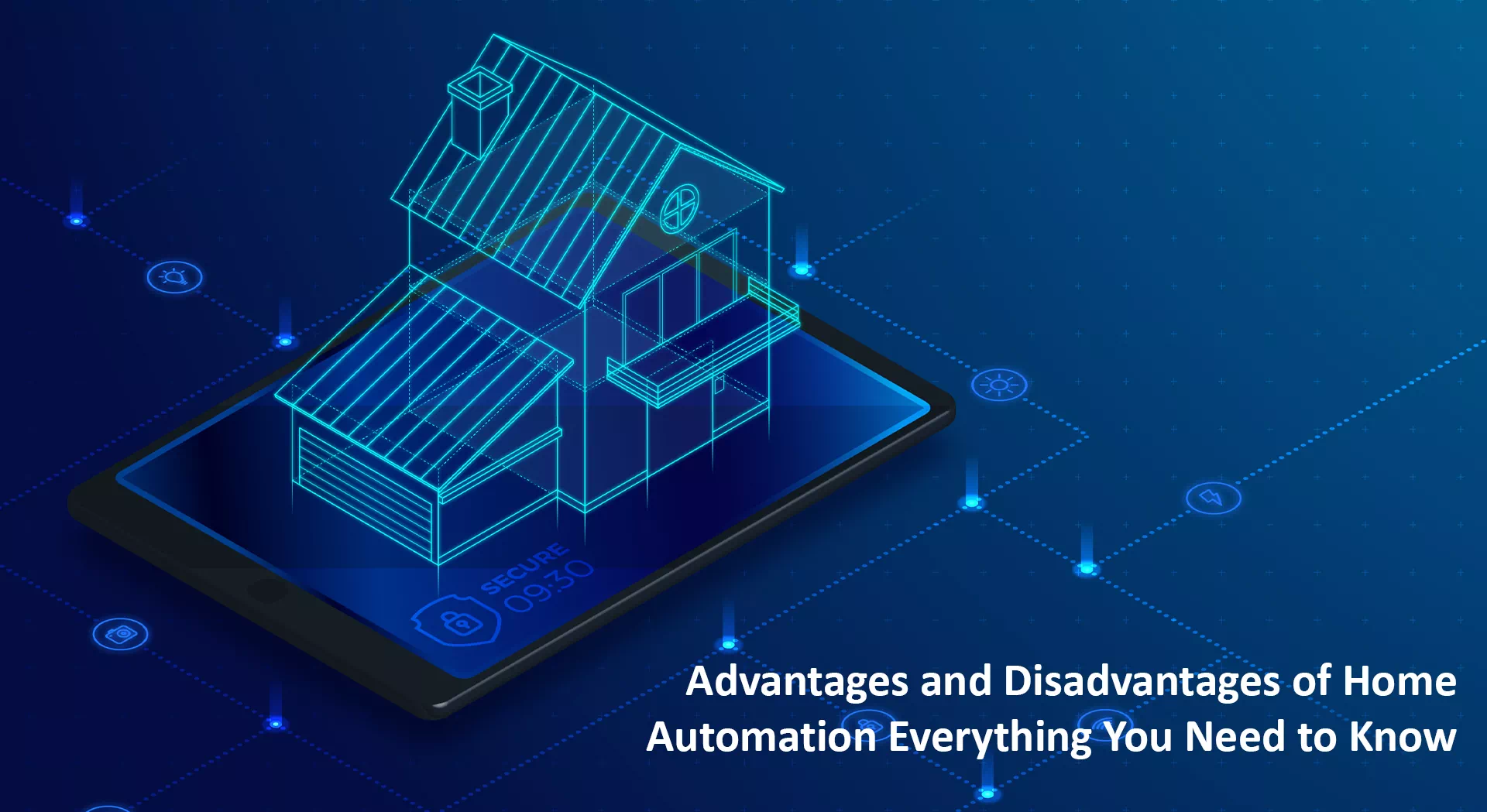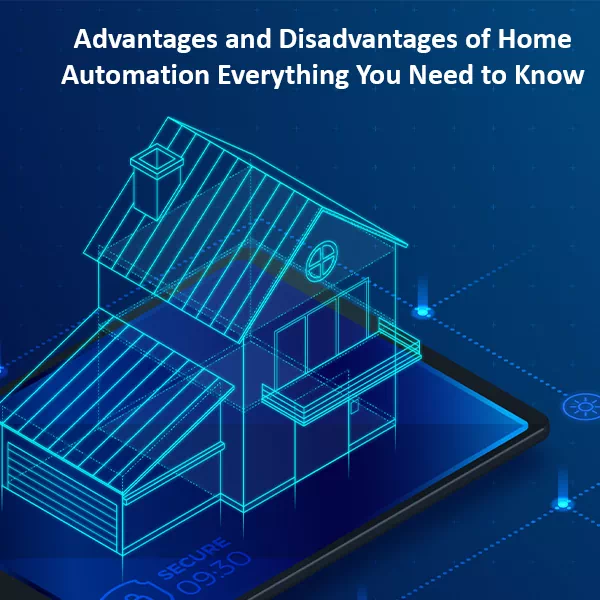One of the biggest advantages of home automation is convenience. With automated systems, homeowners can control various aspects of their homes from a single location and with just one click. For instance, they can adjust room temperatures or lighting levels without having to physically go to each room. They can also use voice commands or mobile apps to turn on/off appliances and monitor their homes remotely.
Another advantage of home automation is energy efficiency. Automated systems allow for more precise control over heating and cooling, which means that homeowners can avoid unnecessary energy consumption and save money on their utility bills in the long run. Additionally, some smart appliances have built-in sensors that detect when they're not being used, allowing them to automatically shut down when not needed.
However, there are also some disadvantages to consider when it comes to home automation. One potential issue is the cost - automated systems can be expensive upfront, although this can be offset by long-term savings on energy bills. There's also a possibility that these high-tech gadgets may malfunction or fail, potentially causing inconvenience or unexpected expenses for repairs or replacements. Lastly, some people may feel uncomfortable with the idea of their homes being monitored by technology all the time and prefer traditional methods instead.
Here you can get easily all advantages and disadvantages about home automation.
Advantages of home automation
Energy saving
One of the biggest advantages of home automation is that it can help you save energy. With smart thermostats, lighting systems, and appliances, you can easily monitor and control your energy usage. For instance, if you forget to turn off your lights or electronics when leaving a room, you can do so remotely using your smartphone or tablet. This not only saves energy but also reduces your electricity bills.
However, one disadvantage of home automation is that it can be expensive to install and maintain. Smart devices are often more expensive than traditional ones, and they require a reliable internet connection to work properly. Moreover, some people may find it difficult to set up and use these devices without technical knowledge.
Despite the drawbacks, home automation technology continues to improve over time, making it easier for homeowners to save energy with minimal effort. By investing in smart devices that are user-friendly and affordable in the long run, homeowners can enjoy both comfort and convenience while reducing their carbon footprint.
Smart Home Security
Smart home security is one of the most attractive features of home automation. With smart homes, homeowners can enjoy enhanced security and peace of mind. Smart home security systems are designed to work seamlessly with other devices in the home, such as door locks, sensors, and cameras. This means that homeowners can monitor their homes remotely through a mobile app or web portal.
One advantage of smart home security is that it provides real-time alerts when something unusual occurs in the home. For example, if someone tries to break into the house or open a window when no one is around, an alert will be sent to the homeowner's phone or email address. Additionally, smart cameras come with motion detection technology that can detect suspicious activity and trigger an alarm.
However, there are also some disadvantages associated with smart home security. One potential issue is privacy concerns related to data collection from various devices installed in the house. Also, if these high-tech systems fail due to technical issues or hacker attacks, they may leave your property unprotected and vulnerable to thefts or burglaries. Therefore, investing in reliable smart home systems from trusted brands should be a priority for any prospective buyer looking for enhanced safety measures using modern technologies like automation tools and more advanced options available on today's market.
Ease of access
One of the most significant advantages of home automation is the ease of access it provides to control your home's various devices and systems. With just a few taps on your smartphone or tablet, you can easily turn off lights, adjust your thermostat settings, and even lock your doors from anywhere in the world. This level of accessibility not only makes life more convenient but also enhances home security by allowing homeowners to monitor their property remotely.
However, there are also some potential disadvantages to consider when it comes to ease of access in home automation. For instance, if someone gains unauthorized access to your device or network, they could potentially control or sabotage any connected devices in your home. Additionally, relying solely on digital controls may make it more challenging for older adults or individuals with disabilities to operate certain appliances or systems in the house.
Despite these drawbacks, overall ease of access remains one of the most important benefits that come with embracing smart technology at home. By leveraging advanced automation platforms, you can streamline household operations while gaining greater peace of mind about safety and security.
Connection
One of the major advantages of home automation is the ability to create a strong connection between different devices in your home. This connection allows for seamless communication and interaction between devices, making it easier to control various aspects of your home with just a few taps on your smartphone or tablet. For instance, you can use an app on your phone to turn off all the lights in your home at once or adjust the temperature settings without having to physically move around.
On the other hand, one disadvantage of this high level of connectivity is that it increases the risk of cyber-attacks and breaches. Hackers can take advantage of poorly secured Wi-Fi networks, smart speakers or other connected devices to gain access to sensitive information such as login credentials, bank account details and more. To avoid this risk, it's important to always ensure that security protocols are in place when setting up any type of smart device in your home.
Despite these disadvantages, creating a strong connection between different devices in your home through automation can ultimately make daily tasks much simpler and improve overall convenience levels. It can help you save time and energy while providing added peace-of-mind knowing that you have complete control over what goes on inside your house - even when you're not there physically.
Comfort
Comfort is one of the most significant advantages of home automation. With the help of automated systems, you can create a comfortable environment in your home that suits your preferences. For instance, you can adjust your home’s temperature to your desired level without leaving the comfort of your bed or couch. Additionally, automated lighting systems allow you to control the ambiance and mood in different rooms by dimming or brightening lights as per your preference.
One disadvantage of home automation when it comes to comfort is that technology sometimes fails. In case there is a power outage or technical issues with automated systems, it can be frustrating and uncomfortable for homeowners who are used to relying on these systems. Furthermore, some individuals may find automation challenging and prefer traditional methods such as manually adjusting their thermostat instead of using an app on their phone.
Overall, while there are pros and cons to automating comfort within a home, there is no denying that when done correctly, it can significantly enhance quality of life for many homeowners looking for convenience and luxury.
Kindness to the environment
When it comes to home automation, one of the biggest advantages is the ability to be kinder to the environment. With automated systems controlling heating and cooling systems, lighting, and other energy-consuming devices, homeowners can reduce their carbon footprint and save money on energy bills.
One example of this is smart thermostats that learn your daily routines and automatically adjust your home's temperature accordingly. This not only saves you money but also reduces unnecessary energy usage. Similarly, automated lighting systems can be programmed to turn off lights in unoccupied rooms or use energy-efficient bulbs.
However, there are some disadvantages to consider when implementing home automation for environmental purposes. The initial cost of installing these technologies can be expensive, which may deter some homeowners from investing in them. Additionally, if not properly programmed or maintained, these systems can actually increase energy consumption rather than decrease it.
Overall, while there are both advantages and disadvantages to implementing home automation for environmental reasons, with proper planning and maintenance the benefits can greatly outweigh any drawbacks.
Disadvantages of home automation
Complexity
One of the major concerns with home automation is complexity. While smart technology has made our lives more convenient, it can be overwhelming for those who are not tech-savvy. Installing and setting up a home automation system may require professional assistance or hours of research and troubleshooting. Additionally, managing multiple devices and applications can become confusing and time-consuming.
However, it's important to note that most home automation systems come with user-friendly interfaces that simplify the process. Moreover, once set up properly, these systems tend to function seamlessly and autonomously without frequent maintenance. In fact, many homeowners appreciate the complexity of these systems as they offer greater control over their homes' security, energy consumption, and comfort levels.
Overall, while complexity presents a potential disadvantage for some homeowners when it comes to home automation systems' installation and management processes; many others appreciate its advantages in providing them with greater control over their living spaces.
Installation cost
Although the cost for installation may be costly initially, the investment will make sense over the long term. In the technology for home automation business is growing quickly currently and is coming up with low-cost smart solutions, such as the free service of maintenance. Consumers can also purchase essential smart devices and then upgrade later, as per their budget.
Internet dependency
One of the disadvantages of home automation is an increased dependency on the internet. As more and more devices are connected to the internet, homeowners become reliant on a stable and fast internet connection. This can cause problems if there is an outage or if the internet speed is slow. Without internet access, some features of home automation systems may not work properly or at all.
Another issue with this dependency on the internet is that it creates potential security risks. Cybersecurity threats targeting smart homes have been increasing in recent years, with hackers gaining access to personal information or even taking control of smart home devices through vulnerabilities in their network connections. Homeowners need to be vigilant about securing their networks and keeping software up-to-date to mitigate these risks.
Despite these challenges, many still see the benefits of home automation outweighing its drawbacks. However, understanding and addressing these concerns around internet dependency and security are crucial for ensuring safe and reliable use of smart home technologies.
Final Words
In conclusion, home automation is a game-changing technology that offers numerous benefits to homeowners. It provides convenience, comfort, and peace of mind while also enhancing energy efficiency and security. With the ability to control everything from lighting to temperature with just a few taps on your smartphone or tablet, it's no wonder that more and more people are embracing this technology.
Overall, when properly implemented, home automation has the potential to revolutionize our lives in countless ways. By weighing its advantages against its disadvantages and taking appropriate precautions for safety and security, you can confidently decide whether or not it's right for you.


